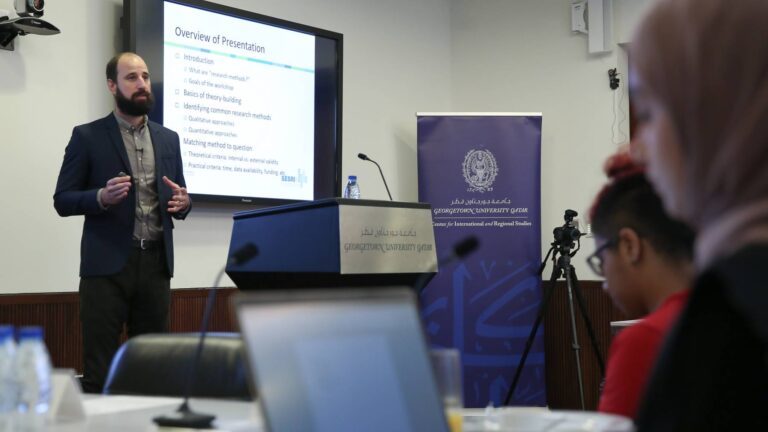Student Engagement
CURA Workshop: Introduction to Research Methods

CIRS hosted its second CURA workshop for GU-Q students on the topic “Introduction to Research Methods” The workshop, held on February 7, 2019, presented a conceptual definition of research methods, introduced methodological approaches, addressed practical issues concerning data availability, and helped students to identify appropriate strategies for tackling their own research projects.
Justin Gengler, Assistant Research Professor at the Social and Economic Survey Research Institute (SESRI) at Qatar University, gave a presentation that served to identify methodological and scientific research approaches. He shared the basics of theory building, including but not limited to, case studies, process tracing, large-N, surveys, and randomized experiments. He emphasized the concepts of internal and external validity as tools for evaluating the strengths and weakness of different methods.
“After attending the first CURA Workshop, the second one was definitely beneficial as it allowed me to build on my prior knowledge and work on my research skills.” – Khushboo Shah (class of 2022), CURA Administrative Fellow.
His key point was that some approaches are better suited for particular types of research questions, and that there exists a link between a research question and the method used to investigate it. Gengler led interactive sessions with the students in order for them to identify the best methodological approach given a specific research question. One exercise consisted of determining and explaining the dependent variable and the causal processes of different study cases.
The workshop was facilitated by Elizabeth Wanucha, CIRS Project Manager, and Islam Hassan, CIRS Research Analyst, with the assistance of Shaza Afifi, Mohammed Al-Jaberi, Ameena Almeer, Chaïmaa Benkermi, Irakli Gobejishvili, Irene Promodh, Abdul Rehmaan Qayyum, and Khushboo Shah—all current CURA Fellows. The Fellows guided group activities that consisted of matching a research question to the most suitable methodological approach put forward by Gengler.
“The workshop taught me much more than just methodological research plans, but also how to cooperate and compromise as a group and appreciate each other’s contributions, regardless of how radically different they may seem.” – Irene Promodh (class 2021), CURA Research Fellow.
The different exercises, through both the PollEverywhere interactive medium and individual reflection, helped students identify the appropriate methodological approach to answer the research question: “How does university study abroad by Qatar-based students influence their attitudes toward gender relations in society and in the family?” After individual reflections, students formed small groups to come to an agreement on the following criteria for the predetermined question: the scope of the case to be considered; the level of analysis; the indicators and variables to be studied; the theoretical limitations of the chosen approach; and the practical challenges of the chosen approach. The groups then formulated their proposals and presented them to the full group for feedback and evaluation.
CURA Research Fellow Abdul Rehmaan Qayyum (class of 2021) commented that the workshop would “help people seeking to publish papers for CURA, researching for UREP, or even those who plan on pursuing a master’s degree.” Another participant described the group activity as “extremely helpful,” notably due to the feedback from CIRS staff and Professor Gengler.
Seventeen students from all class years attended the workshop. The workshop was useful for all participants, from freshmen working on their midterm papers to seniors preparing for their honors. Those who successfully completed the workshop were awarded electronic badges that could be shared on their LinkedIn profiles.
CIRS has been promoting students’ research skills and research methodologies through its CURA workshop series. GU-Q students will be able to participate in the next CURA workshop in fall 2019.
Article by Chaïmaa Benkermi (class of 2021), CURA Publications Fellow